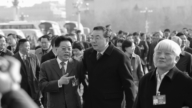【新唐人2011年3月7日讯】“放慢经济增长速度,提高增长品质”是大陆两会要讨论的“十二五”规划纲要。但经济学家认为,“国(企)进民(营)退”的趋势如果不能得到扭转,大陆持续发展将成为一句空话。
中国大陆经济问题已成为政府和社会问题。德国《商报》认为,在中国,经济财富的分配极不均衡。贫富悬殊分裂社会,尤其是在当前。
《路透社》报导,北京“天则经济研究所”2号发布报告说,中国存在结构性的“国进民退”现象,国企绩效是在享受种种政策优惠,以及和民营企业在不平等的经营环境下所取得的。
美国耶鲁大学金融学教授陈志武在《美国之音》的采访中也表示:问题的根源就是政府在经济中的力量过于庞大,而民营企业的力量过于弱小。
陈志武:“当政府拥有国家大部分资产的时候,中国经济无论是过去还是在未来,都不得不严重依赖投资和出口就不难理解了。财富效应的主要受惠者自然是政府。相反,家庭消费因收入增长缓慢而无法快速增长。”
陈志武据中共官方的资料推算,政府和国企掌握的资产总额占全国财富总额的3/4﹔家庭财富在GDP中所占的比例,逐渐降低到最近的35%﹔政府的开支超过40%﹔现在每年的税收收入,超过了相当于8亿城市居民一年的可支配收入。
不仅如此,陈志武:“要比较中美经济的增长速度,首先就应该把中国的增长资料除以二,因为中国家庭只能够从工资增长这一个管道感受到经济增长的好处。通过资产和土地升值来增加财富的管道,基本上被国企和政府封死了。”
“国进民退”之所以能够在大陆持续发展,陈志武认为,是因为一党专制,没有制约政府和国企过度膨涨的力量:政府想加税就加税,想上什么项目就上什么专案,想整治私人企业就可以整治。
这位在美中两国知名度很高的经济学家认为,“国进民退”的趋势如果不能够彻底改变,即便是放慢了增长步伐,经济增长的品质也难以提高,民众也无法享受增长带来的利益。
德媒认为,从西方的角度看,突尼斯、埃及和利比亚有关“稳定”与“自由”的价值之争,也适用于中国。这也是北京的当权者日益恐惧和目前竭力防控的。
新唐人记者宋风、周平综合报导。
Expansion of SOE Widens Gap between Rich and Poor
The theme of the 12th 5–year plan discussed on CCP’s
“two meetings” is “to slow down the economy growth
and to improve quality.”
Experts believe, if the expansion of state-owned firms
and shrinking of the private sector continue,
the sustainability of the economy will be empty talk.
China’s economic problems are now societal issues.
German newspaper Handelsblatt analyzes that
disparity in wealth distribution is extremely severe.
The gap between the rich and poor divides the society.
According to Reuters, a report by Beijing’s
Tianze Economic Institute found that China has
a structural problem, where state-owned businesses
enjoy favorable policies and competition advantages,
while the private sectors struggle.
Financial Professor Chen Zhiwu of Yale told VOA,
The root of the problem lies in the strong influence of
government in economy and a weak private sector.
Chen: As the government owns the majority of assets,
the economy relies on foreign investments and exports.
The beneficiary of the wealth effect is the government.
Meanwhile, family consumption will not increase rapidly
due to the slow income increase.”
Chen estimated, Chinese government and
state-owned firms own 75% of the state wealth.
Family wealth recently declined to 35% of GDP.
Government expenditure exceeded 40%.
The tax revenue exceeds the annual dispensable
income of 800 million urban residents in China.
Chen: Before comparing U.S. and China’s GDP growth,
we first should divide China’s figures by two.
Chinese families only benefit from salary increases.
To increase wealth through asset and land
appreciation are blocked by the state owned firms
and the government.
Chen believes, the situation of a strong public sector
and a weak private sector continues in China,
due to the one-party system, where there is no force
constraining the expansion of the government and
SOEs. The government can increase taxes,
initiate projects and punish private businesses at will.
This well-known economist thinks that
if the situation cannot be completely changed,
even though the economic growth is slowed down,
it is hard to improve the economy’s quality.
People won’t be able to benefit from the growth.
German media reported,
from the western point of view,
the struggle between “stability”and“freedom”
in Tunisia, Egypt and Libya also applies to China.
That’s what Beijing fears and tries its best to prevent.
NTD reporters Song Feng and Zhou Ping.




























